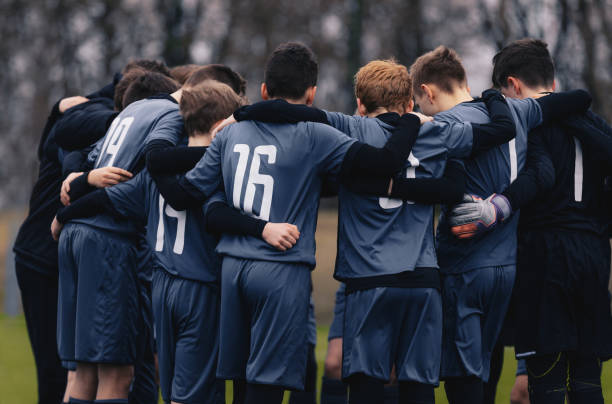This is relationship building through soccer when you know your team is clicking. They are all playing well as a collective unit and each player in the unit has confidence in and believes in the next player in the team.
It means they are willing to pass them the ball knowing they will look after it, cover them just in case they get caught out of possession and protect them should they make a mistake.
At the centre of all football teams are the relationships between the players. Each player has a relationship with the next player and with the team as a whole. The stronger those relationships are, the more in-sync the team will be. The more synchronised they are, the more successful they will become.
But, how can you as a coach, foster that relationship-building?
Those crucial relationships, not just between the coach and the player, but just as importantly between the players in their units and the team e.g., goalkeeper and the defence?
Trust

This is an essential part of any team, leading to strong team cohesion. It is the coach that needs to develop trust in one another and the goal you are all working towards by shaping the team’s culture. As the leader of the team, it is the coach’s responsibility to shape the team’s culture into one that embodies trust.
Football is a game played by individuals as part of a team not apart from the team. No single player makes a team and no single player can do everything in the team on their own, they need support from the other players around them to be the best version of themselves.
Players have to learn to trust that their teammates will do their part, whether that is running the hard yards out of possession or supplying a pass for someone else to score a goal. When that team bond is strong the players will stick together and help one another to get the team out of the tough times.
Commitment

It is easy to stay committed and work hard together when everything is going well and you’re regularly winning. However, it is a lot harder when you are struggling, facing more challenges and things are not going so well.
There are and will be many moments in football where players will be tested to their limit and it is in these challenging situations such as injury, not being selected and a slump in performance. It could also be personal-related issues, such as school exams, work underachievement, and family bereavement when commitment becomes a vital ingredient to the survival of the relationship with teammates.
If there is a strong commitment between the players and also the players and the coach then you are more likely to overcome the highs and lows of what the game will throw at you.
Communication
Communication has to be strong and effective if the team is to have any chance at all. I previously wrote a whole article on why effective communication is the ultimate skill in football, which you can find by clicking the link. But here is a small piece: mistakes can and will happen when communication is not adequate on the field.
Good effective communication goes hand in hand with trust and respect. Because with trust and respect you and the players will have a stronger voice to share your opinions and expectations.
When you practice clear effective communication you will not only avoid misunderstandings, but you will also earn the respect and trust of your players/teammates through honesty and clarity.
The same goes for the players as well as you as the coach.
Support

There is an old saying that goes ‘ a team is only as strong as its weakest link’, so every player needs to understand they have a responsibility to help and support the next player in the team.
For anybody that is struggling technically, tactically, physically, socially or psychologically it is not just the responsibility of the coach but the players’ teammates to help them. There will be moments when mistakes happen and it is those moments when you need the support of the people around you to keep you motivated and continue to push forward and not dwell on them.
Respect
In a football team, everything has to come from a place of respect, which should be mutual and earned. You as the coach must ensure that the respect you give is equally spread between all your players, making sure not to have any favourites in the team.
Teammates have to be honest with each, but sometimes they may hesitate for fear of hurting someone’s feelings. As a coach, you can help them by teaching your players how to criticise a player constructively. Teach them the ‘positive sandwich’ approach. start with a compliment or something positive, give them some critical advice then finish with something else positive.
This shouldn’t affect the player’s emotions or egos as it comes from a place of respect and should fuel them into improving during training and match days.
Conclusion
These kinds of relationships do not just happen naturally, you have to create a close-knit team by encouraging your players to get to know each other. If you can create a family-type atmosphere within your team the players will be trustworthy, respectful, and motivational and will support each other as they will truly care about their teammates.
With a tightly bonded group of players, they will communicate effectively and much easier than if they are just a bunch of players on the same team. As a coach, you can support this relationship building by doing activities away from the training field, so they can get to know each other away from soccer.
It all sounds easy I know and it is a lot easier to have a strong committed bond when your team is on a winning streak, but you will only, truly know how strong those relationships are when things are not going so well or you are losing regularly.

If you enjoyed this article and have any questions or comments or just wish to share your thoughts.
Please leave them in the comments box and I will respond once I get the chance.


